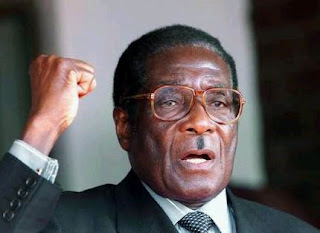In Kenya, where Barack Obama's father and grandfather were born into the minority Luo ethnic group, there is a joke doing the rounds: it is said that a Luo has a much better chance of becoming the President of the United States than of Kenya.
The joke puts a light spin on a profound observation. In closed, patronage societies, it is unheard of for people outside the ruling cabal's network of patronage - whether that network is connected by race or ethnicity or religion or class - to be given the opportunity to lead their countries. That is why I found it deeply ironic that Robert Mugabe congratulated Obama on his win.
That is why I found it deeply ironic that Robert Mugabe congratulated Obama on his win.
Mugabe single-handedly turned his country into a closed, patronage society by eroding the rights of minority Ndebele-speakers and later majority Shona-speakers, by abusing state power for personal gain, by denying opportunities to all those outside his inner circle, and by refusing to concede defeat at the polls.
The Zimbabwean dictator interpreted Obama's victory through a racial prism; he saw it as an affirmation of racial identity. In fact, it was the exact opposite. It was the triumph of the open, opportunity society that enabled Obama to transcend racial barriers. Throughout his life he has recognised and used the opportunities open to him in America. He made it to the White House because he grew up in a society that is the antithesis of Mugabe's Zimbabwe. This is the lesson that ANC President Jacob Zuma should also take to heart when he hails Obama's victory. But judging from the statements emanating from Zuma himself, as well as his family and the ANC, it seems the real insights escape them. They are still bound by the shackles of race, and see everything through a racial lens. They see Obama's victory as a racial victory.
This is the lesson that ANC President Jacob Zuma should also take to heart when he hails Obama's victory. But judging from the statements emanating from Zuma himself, as well as his family and the ANC, it seems the real insights escape them. They are still bound by the shackles of race, and see everything through a racial lens. They see Obama's victory as a racial victory.
They must understand that Obama's win did not symbolise the victory of any racial group. It was a triumph of a society which strives to ensure that all citizens have the opportunities they need to take responsibility for their lives, irrespective of the circumstances of their birth, and become the best they can be.
This is the vision that animates the DA. We call it the open, opportunity society for all. It stands in direct contrast with the ANC's philosophy of a closed, patronage society for some. Key features of the ANC's policy approach (including "cadre deployment" and "representivity") make the emergence of an Obama extremely difficult, if not impossible. That is why it is so ironic that the ANC has claimed Obama's victory as its own.
In his bid to become President, Obama had to take on the Washington elite, and the power-brokers in his own party. As he remarked during his acceptance speech, he was never the likeliest candidate for President. He did not start with much money or many endorsements. And his campaign was "not hatched in the halls of Washington"; it began "in the backyards of Des Moines and the living rooms of Concord and the front porches of Charleston ".
The mere fact that Obama won his own party's nomination during the so-called "primaries" - and stared down the powerful Clintons in doing so - is a testament to the open, opportunity process of candidate selection in American politics. It is a process which guarantees transparency and affords the underdog the same chances as the bookmakers' favourite. It allows voters to examine the candidates, hear them debate, and judge them on the issues. That is why millions of white and Hispanic Americans voted for Obama. They considered him the most inspiring and competent candidate.
Subscribe to:
Post Comments (Atom)
0 comments:
Post a Comment